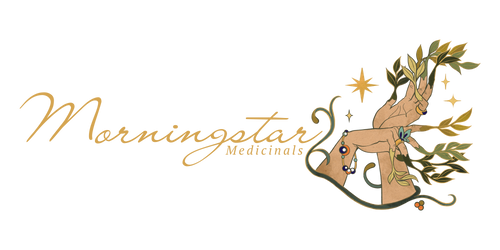There’s a certain kind of magic to herbs. The way a well-matched plant can soothe a frayed nervous system, ease a deep ache, or open the breath in a single moment—it’s easy to romanticize them as the answer to everything, especially in comparison to allopathic medicine. But the truth is this: herbs are not here to save us. They can support, nourish, and guide the body back into balance, but they are not a quick fix, and they are certainly not a replacement for doing the deeper work of healing.
And yet, many of us come to herbalism with the same mindset we bring to pharmaceuticals—looking for something to “fix” us. We want so badly for something outside of ourselves to be the answer. We trade one pill for another, one bottle for another, without ever asking the real question: Are we willing to be well?
Western medicine often treats the body like a machine—something that breaks down and needs repair. But we are not just biology; we are belief systems, emotional patterns, and energetic signatures. Our thoughts, emotions, subconscious conditioning, conflicts, and generational patterns have a direct impact on our health. Chronic stress, unresolved trauma, and deep-seated beliefs about our own limitations can create biochemical shifts in the body that lead to real, physical dis-ease.
This isn’t about “thinking positive” your way out of illness—it’s about recognizing that psychological conflicts create physiological responses. When we are trapped in cycles of fear, anger, grief, or self-sabotage, the body (and our reality) responds accordingly. The fascial systems degrade. The nervous system stays dysregulated. The immune system weakens. Inflammation rises. Organs become congested.
No herb in the world can override a mind that is committed to its suffering.
Are We Willing to Let Go of Our Stories?
One of the hardest truths to face is that many of us—whether consciously or unconsciously—hold onto our illnesses because they serve us in some way. Maybe sickness gives us permission to rest in a world that only values productivity. Maybe it keeps us safe from facing something deeper, or allows us to hold onto an identity that feels familiar. Healing requires more than just taking the right herbs (or drugs, and I mean this in both the pharmaceutical and psychedelic sense)—it requires us to look at what we are holding onto and ask:
- What am I getting from staying unwell?
- What would I have to face if I got better?
- What do I believe it's going to cost me to be well?
- Am I ready to release my attachment to suffering?
These are not easy questions. But they are necessary ones.
Herbs work in partnership with the body’s natural intelligence. They don’t force; they remind. They remind the lungs how to open, the liver how to detoxify, the nervous system how to settle. But they can only do so much if we are still locked in the mental and emotional patterns that created imbalance in the first place. Plants don’t heal us. They support us while we do the work of healing ourselves by offering their intelligent, living consciousness and energetic architecture to us as relatives in a time when we can't tap into our own. This is what makes them allies for us as we heal and a much better option than synthetic drugs.
So before reaching for the next tincture, the next supplement, the next miracle cure—I invite you to pause. Ask yourself what you truly need. Herbs can nourish and rebalance, but real healing happens when we bring the body, mind, and spirit into alignment. Herbs can certainly be a player in orchestrating this alignment, but also ask yourself:
Are you ready to let go of what’s keeping you sick? Are you willing to step into wellness? Because in the end, no plant, no pill, no protocol can do that for you.
The choice is yours alone. 🌿

